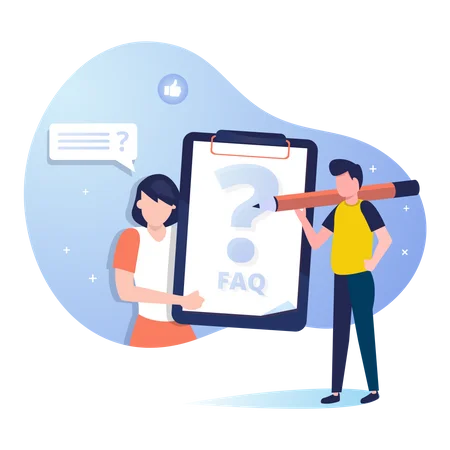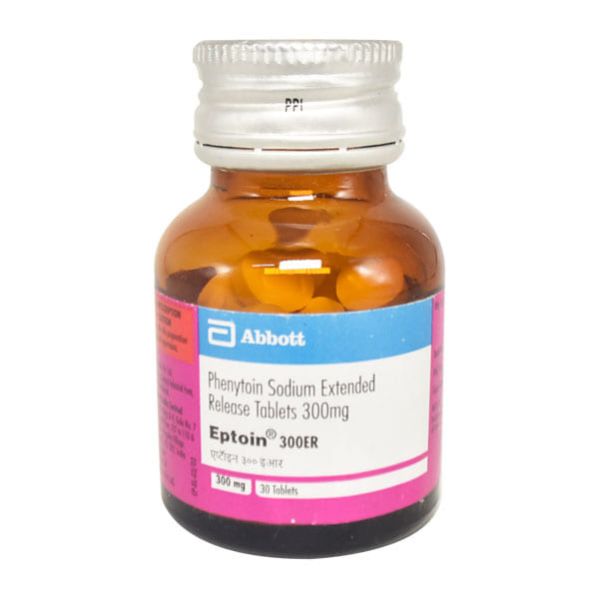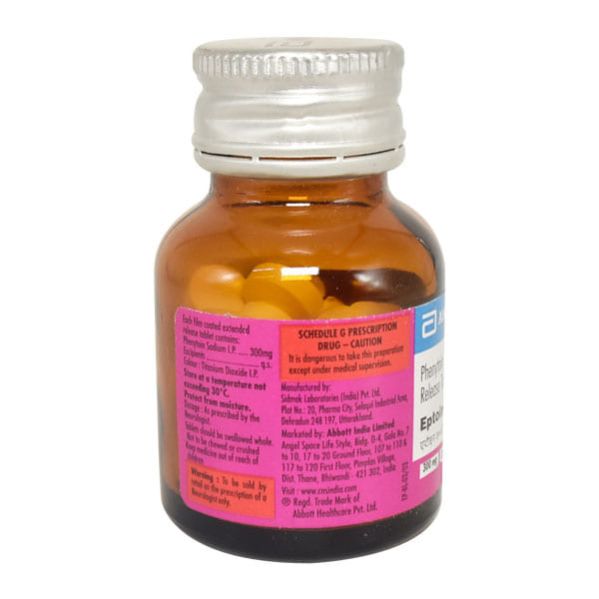Eptoin ER 300mg Tablet 30'S
Phenytoin 300 mg
₹ 204.00
₹221
(Inclusive of all taxes)
-

No Warranty
-

COD Avilable
-

Non Returnable
-

cancelable
About this item
INTRODUCTION ABOUT EPTOIN ER 300MG TABLET
EPTOIN ER 300MG TABLET contains Phenytoin which belongs to the group of medicines called Anti-epileptic drugs. It is used to manage certain forms of epilepsy (fits or seizures) during or after brain surgery or severe head injury. Epilepsy is defined by the occurrence of at least two unprovoked seizures with or without fits (strong, involuntary contractions of the voluntary muscles) parted by at least 24 hours. A seizure results from an excessive discharge of specific nerve cells and it is characterized by changes in electrical activity (detected by electroencephalogram (EEG). EPTOIN ER 300MG TABLET is also used to manage trigeminal neuralgia (facial nerve pain).
During management with EPTOIN ER 300MG TABLET, your doctor might ask you to take several blood tests, to monitor any side effects, and to check the amount of phenytoin in blood to make dose adjustments. You should brush and floss your teeth and see a dentist regularly while taking EPTOIN ER 300MG TABLET, to manage overgrowth of gums.
Before taking EPTOIN ER 300MG TABLET, inform your doctor if you have any liver or kidney problems, or porphyria. Avoid consumption of alcohol while taking EPTOIN ER 300MG TABLET as it may affect its concentration in the blood. EPTOIN ER 300MG TABLET should be used with caution in pregnant women only if advised by the doctor as it may cause harm to the unborn baby. Women of childbearing potential should use a suitable non-hormonal contraceptive method to avoid getting pregnant while taking EPTOIN ER 300MG TABLET. It is not recommended for use in breastfeeding women.
Patients taking EPTOIN ER 300MG TABLET may have self-harming thoughts. If at any time you have these thoughts, immediately consult your doctor. EPTOIN ER 300MG TABLET should be cautiously used in children and in elderly patients, particularly with kidney or liver problems. The most common side effects of taking EPTOIN ER 300MG TABLET are irregular or involuntary eye movements, slurred speech, drowsiness, problems with movement and balance, decreased coordination and confusion. Consult your doctor if any of the side effects worsen.
USES OF EPTOIN ER 300MG TABLET
It is used to:
- Manage certain forms of epilepsy (that occur during or after brain surgeries or severe head injury)
- Manage trigeminal neuralgia (facial nerve pain)
HOW EPTOIN ER 300MG TABLET WORKS
EPTOIN ER 300MG TABLET controls seizures (fits) by reducing the abnormal activity of the nerve cells in the brain. It also reduces the pain by blocking the transmission of pain signals across the nervous system thus reducing the symptoms of trigeminal neuralgia.
DIRECTIONS FOR USE
Take EPTOIN ER 300MG TABLET as advised by your physician. Swallow EPTOIN ER 300MG TABLET with a glass of water. Do not crush or chew the medicine. Your doctor will determine the correct dose and duration for you depending on your age, body weight and disease condition. Do not stop taking EPTOIN ER 300MG TABLET unless your doctor advises you to stop.
SIDE EFFECTS OF EPTOIN ER 300MG TABLET
COMMON
- irregular or involuntary eye movements
- slurred speech
- drowsiness
- problems with movement and balance
- decreased coordination
- morbilliform (measles-like) rash
- confusion
RARE
- allergic reactions (such as a severe rash)
- drug reaction with eosinophilia and systemic symptoms (DRESS) (signs include fever, rash, facial swelling and enlarged lymph nodes)
- dyskinesias (impaired voluntary movement) including chorea (jerky involuntary movements of the shoulders, hips, and face), dystonia (muscular spasm and abnormal posture)
- shaking and asterixis (inability to maintain sustained posture with subsequent brief jerky involuntary movements)
- certain types of dermatitis (skin inflammation)
Stop taking EPTOIN ER 300MG TABLET and contact your doctor immediately if you experience any of the following side effects:
- severe allergic reactions (swelling of the eyelids, face, lips, mouth, throat and tongue which causes breathing or swallowing difficulties and sudden wheeziness)
- signs of blood abnormalities (bruising, fever, severe sore throat, paleness, decreased red and white blood cells or platelets)
- sudden stopping of the heart known as cardiac arrest (signs include shortness of breath, being unconscious or unresponsive)
- bradycardia (signs include dizziness, tiredness, slow or skipping heartbeats and chest pain)
- suicidal thoughts or actions (like thoughts or attempts of suicide or dying, new or worsened depression, anxiety or irritability, agitation or restlessness, panic attacks, trouble sleeping, aggression, anger or violence, acting on dangerous impulses, mania (extreme increase in activity and talking) and other unusual changes in behaviour or mood)
- serious skin reactions (such as stevens-johnson syndrome, toxic epidermal necrolysis and acute generalized exanthematous pustulosis) accompanied by reddish spots or circular patches with widespread blistering and peeling of the skin, ulcers in the mouth throat, nose and genitals, red and swollen eyes, flu-like symptoms, and red scaly rash with bumps under the skin)
- hypersensitivity reactions (skin rash and fever, swollen glands) and in severe cases it causes an inflammatory disease called systemic lupus erythematosus (signs include pain and swelling of the joints)
- have confusion or mental illness (signs of high amount of medicine in the blood)
HOW TO MANAGE SIDE EFFECTS
Dizziness Or Drowsiness
Try a few lifestyle changes to improve your energy levels when you feel drowsy such as taking and maintaining a consistent sleep schedule. Exercise regularly (such as daily walks or running) and eat a nutritious diet with plenty of whole grains, legumes, fruits, and vegetables. Consult your doctor if the symptom worsens.
Skin Rash Or Itching
Avoid hot bathing because hot water can irritate the skin further. Do not scratch the affected area. Use protective clothing when going outdoors. Regularly moisturize the skin. Consult your doctor if the symptom worsens.
WARNING & PRECAUTIONS
PREGNANCY
Use with CautionEPTOIN ER 300MG TABLET should be used with caution in pregnant women as it may cause harm to the unborn baby. Women of childbearing potential should use a suitable non-hormonal contraceptive method to avoid getting pregnant while taking EPTOIN ER 300MG TABLET. Consult your doctor before taking this medicine and inform your doctor immediately if you become pregnant during management with EPTOIN ER 300MG TABLET.
BREASTFEEDING
ContraindicatedEPTOIN ER 300MG TABLET is not recommended for use in breastfeeding women as it passes into breast milk. Consult your doctor before taking EPTOIN ER 300MG TABLET.
DRIVING AND USING MACHINES
Use with CautionDo not drive or operate any machines if you experience dizziness or drowsiness while taking EPTOIN ER 300MG TABLET.
ALCOHOL
Consult your doctorAvoid consumption of alcohol while taking EPTOIN ER 300MG TABLET because it may affect the concentration of the medicine in the blood.
KIDNEY
Use with CautionEPTOIN ER 300MG TABLET should be used with caution in patients with kidney disease. Consult your doctor before taking EPTOIN ER 300MG TABLET.
LIVER
Use with CautionEPTOIN ER 300MG TABLET should be used with caution in patients with liver disease. Consult your doctor before taking EPTOIN ER 300MG TABLET.
ALLERGY
ContraindicatedDo not take EPTOIN ER 300MG TABLET if you are allergic to Phenytoin or any other ingredients of this medicine, or similar medicines like hydantoins.
HEART DISEASE
Use with CautionEPTOIN ER 300MG TABLET should be used with caution in patients with underlying cardiac disease as it may increase the risk of cardiac arrest. Consult your doctor before taking EPTOIN ER 300MG TABLET.
USE IN PEDIATRICS
Use with Caution[GBNKEYWORD should be used with caution in children and adolescents. Your child’s doctor may adjust the dose depending on the age and body weight of the child. Consult your child’s doctor for advice.
USE IN GERIATRICS
Use with CautionEPTOIN ER 300MG TABLET should be used with caution in elderly patients and the dose may be adjusted in patients with kidney or liver disease and those taking other medicines. Consult your doctor before taking EPTOIN ER 300MG TABLET.
OTHERS
Before taking EPTOIN ER 300MG TABLET, inform your doctor if you:
- have porphyria (an inherited disease that affects haemoglobin biosynthesis)
- had or have depression, mood problems or self-harming thoughts
- had or have high blood sugar
INTERACTIONS
A. Drug-Drug interactions:
Before taking EPTOIN ER 300MG TABLET, inform your doctor if you are taking any of the following medicines:
- medicines used to manage heart and circulation problems (Ex. amiodarone, digoxin, furosemide, reserpine, warfarin, mexiletine, disopyramide and calcium channel blockers such as diltiazem, nicardipine, nifedipine, nimodipine, verapamil)
- medicines used to lower blood cholesterol (Ex. atorvastatin, fluvastatin and simvastatin)
- medicines used to manage epilepsy (Ex. oxcarbazepine, carbamazepine, topiramate, phenobarbital, lacosamide, lamotrigine, sodium valproate and valproic acid and succinimides such as ethosuximide, vigabatrin)
- medicines used to manage fungal infections (Ex. amphotericin B, fluconazole, itraconazole, ketoconazole, miconazole, posaconazole, voriconazole)
- medicines used to manage tuberculosis and other bacterial infections (Ex. isoniazid, chloramphenicol, sulphonamides such as sulfadiazine, rifampicin, doxycycline, clarithromycin, sulfamethoxazole trimethoprim, ciprofloxacin)
- medicines used in the management of HIV infection (Ex. indinavir, ritonavir, efavirenz, fosamprenavir, saquinavir)
- medicines used to manage stomach ulcers (Ex. omeprazole, sucralfate, cimetidine and antacids)
- theophylline (used to manage asthma and bronchitis)
- medicine used to manage pain (Ex. aspirin)
- medicines used to manage inflammation (Ex. prednisolone, dexamethasone)
- medicines used for sleeplessness, depression and psychiatric disorders (Ex. chlordiazepoxide, clozapine, diazepam, disulfiram, fluoxetine, methylphenidate, paroxetine, phenothiazines such as chlorpromazine, trazodone, tricyclic antidepressants such as amitriptyline, fluvoxamine, quetiapine, sertraline)
- tolbutamide (used to manage high blood sugar)
- medicines used to manage pregnancy (Ex. estradiol, desogestrel)
- medicines used to suppress the immune system and manage graft rejection (Ex. ciclosporin, tacrolimus)
- medicines used to manage cancer (Ex. capecitabine, carboplatin, bleomycin, cisplatin, doxorubicin, methotrexate, fluorouracil)
- medicines used to relax the muscles (Ex. rocuronium, vecuronium)
- methadone (medicine used to manage severe pain)
- medicines used to control blood clotting (Ex. rivaroxaban, dabigatran, apixaban, edoxaban, ticagrelor)
- non-prescription medicines (Ex. folic acid (manages folate deficiency), st. john’s wort (manages depression) and vitamin D (manages osteoporosis))
Overdosage:
If you or anyone else accidentally take too much of EPTOIN ER 300MG TABLET, consult your doctor immediately or visit the nearby hospital. Overdosage symptoms of EPTOIN ER 300MG TABLET include nystagmus (rapid eye movements), ataxia (clumsy movements), dysarthria (trouble speaking), shaking, hyperreflexia (overactive bodily reflexes like twitching), lethargy, slurred speech, blurred vision, nausea, vomiting, low blood pressure, low heart rate.
SYNOPSIS
| Drug | : | Phenytoin |
| Pharmacological Category | : | Anti-epileptic agents |
| Therapeutic Indication | : | Epilepsy, Trigeminal neuralgia |
| Dosage Forms | : | Injection, Tablet, Capsule, Syrup, Suspension |
MORE INFORMATION
STORAGE
- Keep EPTOIN ER 300MG TABLET out of reach of children
- Store at room temperature
0 Review Of Product Eptoin ER 300mg Tablet 30'S














